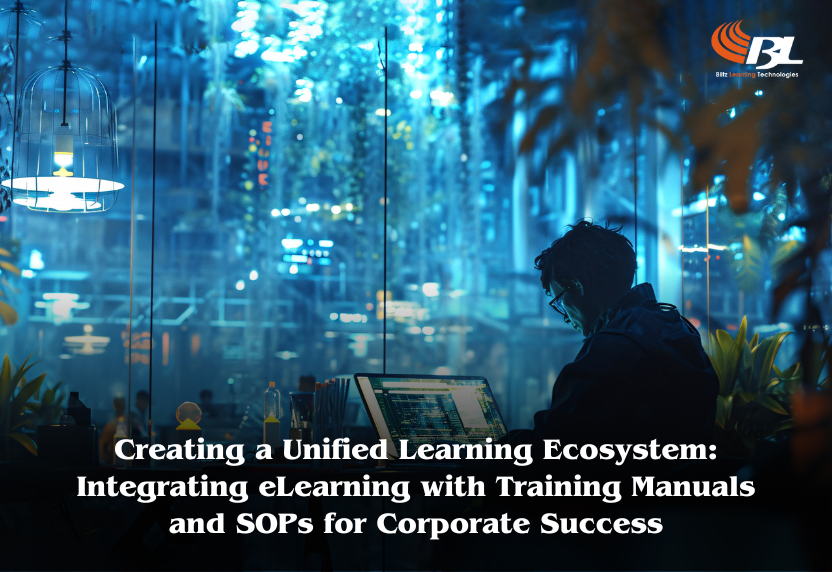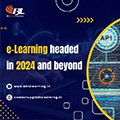
Blog
- Home
- Blog

18Feb
Creating a Unified Learning Ecosystem: Integrating eLearning with Training Manuals and SOPs for Corporate Success
Introduction
In today’s rapidly evolving corporate landscape, organizations are constantly seeking ways to enhance productivity, ensure compliance, and foster a culture of continuous learning. A unified learning ecosystem—where eLearning seamlessly integrates with traditional training manuals and Standard Operating Procedures (SOPs)—emerges as a powerful solution to these challenges. By bridging the gap between digital and traditional learning tools, companies can create a holistic environment that empowers employees, improves efficiency, and ensures consistency in knowledge dissemination.
Enhancing Learning Through Interactivity and Contextual Relevance
One of the key benefits of integrating eLearning with training manuals and SOPs is the ability to provide employees with accessible, contextually relevant, and interactive content. While SOPs offer structured, detailed guidelines and training manuals that provide foundational knowledge, eLearning modules can transform this static information into engaging, scenario-based learning experiences.
For instance, an SOP on workplace safety can be complemented with an eLearning module featuring simulations or real-world scenarios, enabling employees to visualize and apply safety protocols in practice. This not only enhances understanding but also ensures better retention of critical information.
Customization and Real-Time Updates for Accuracy
A unified learning ecosystem allows for greater customization and adaptability. Training manuals and SOPs often require periodic updates to reflect changes in regulations, processes, or industry standards. By incorporating eLearning, organizations can swiftly update digital modules and link them to relevant sections of the manuals or SOPs, ensuring that employees always have access to the latest information. This dynamic approach eliminates the risk of outdated materials being circulated and reduces the time and effort required for manual revisions.
Ensuring Compliance and Accountability
Another critical advantage of this integration lies in its ability to foster compliance and accountability. SOPs are often the cornerstone of regulatory adherence in industries such as healthcare, manufacturing, and finance. However, simply distributing these documents is not enough to ensure compliance. By embedding assessments, tracking mechanisms, and analytics within eLearning platforms, organizations can monitor employee engagement and understanding of SOPs. This data-driven approach not only helps identify knowledge gaps but also serves as evidence of compliance during audits or inspections.
Catering to Diverse Learning Preferences
Additionally, integrating eLearning with traditional resources promotes inclusivity and caters to diverse learning preferences. While some employees may prefer reading detailed manuals, others might find interactive videos or quizzes more effective. A unified ecosystem ensures that learning materials are available in various formats, empowering employees to choose the medium that best suits their needs. This inclusive approach fosters a sense of ownership and engagement, ultimately driving better learning outcomes.
Supporting Sustainability and Cost-Effectiveness
The implementation of a unified learning ecosystem also aligns with modern corporate priorities, such as sustainability and cost-effectiveness. Transitioning to digital learning solutions reduces the reliance on printed materials, thereby minimizing environmental impact. Furthermore, the scalability of eLearning platforms allows organizations to train a large workforce across multiple locations without incurring significant costs, making it an economically viable option for businesses of all sizes.
Conclusion
Integrating eLearning with training manuals and SOPs is no longer a luxury but a necessity for organizations striving for corporate success. This unified approach not only enhances employee engagement and knowledge retention but also ensures compliance, adaptability, and inclusivity. By investing in a comprehensive learning ecosystem, companies can build a workforce that is not only well-informed but also agile and prepared to navigate the challenges of an ever-changing business environment. The synergy between traditional and digital learning tools paves the way for a future where continuous learning becomes the cornerstone of corporate excellence.

Neha Khare
About authorNeha Khare specializes in designing engaging and effective learning experiences tailored to learners' needs and also creates insightful blogs on corporate e-learning. She develops creative instructional methods, integrates multimedia, and aligns content with learning goals. Neha's innovative techniques and blog contributions significantly enhance the quality and impact of corporate training programs.



Leave a comments